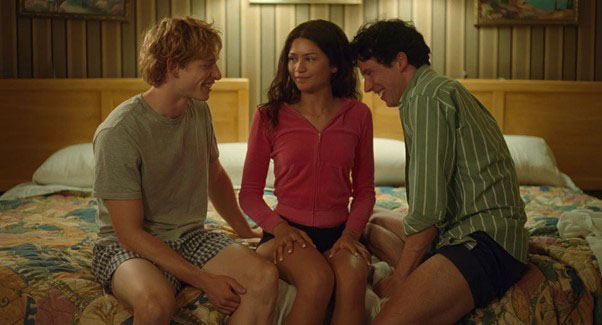In the dark of night, two people have a late-night conversation the evening before a very important tennis match. By this time in the nonlinear narrative of Luca Guadagnino’s “Challenger”, the film has established all the stakes for this match, the challenges it poses, and the potential fall-out for all parties involved – not just the two who will be in court. The moment is charged with clashing emotions as the two people reach something of an agreement. Before we leave the moment, though, one asks the other, “Are you sure this is what you want?” It’s a query that could be as much a hint of the speaker’s own hesitance as it could be an attempt to draw out a meeting that will be over soon. The other responds, in what could be ambivalence or indecision, “What else could I want?”
The question, both the material query and the way it avoids clarity, looms over much of “Challengers”. Fittingly, it’s never answered. By this point in the film, each of the three main characters – hyper-competitive tennis enthusiasts with lots of pride and lots of ego – has established their unwillingness to give too much of themselves away. Just like the film they are in, these are people who are desperate for the upper-hand. It’s the push-and-pull between wanting and taking that the drama is built on, especially the part where we’re not sure who is doing the wanting or the taking.
We open at a challenger tournament in New Rochelle. The tournament is one of the many second-tier paths to the upcoming 2019 U.S. Open. The final of the men’s side presents disparate contenders. Art Donaldson (Mike Faist) is a revered champion of the sport trying to psyche himself out of a losing streak and Patrick Zweig (Josh O’Connor) is the inconsistent upstart who’s struggled to make good on his natural talent. The crowd is locked into the game, especially the former tennis prodigy Tashi Duncan (Zendaya) who both men seem to be playing directly to. We spend a few initial moments on that first set before we begin moving between timelines. We travel back days and then weeks and then years; and, soon “Challengers” is stitching the past and present into a complex quilt of want and wanting.
With a backward jump, we learn that Art and Tashi are married, although not quite happily. She is his coach, after an injury interrupted her own tennis hopes. Another jump moves us further back. We learn that Art and Patrick were doubles-partner when they played tennis as teenagers. As “Challengers” keeps on moving, methodically at first and then frenetically, away from the present to moments in the past we soon come to realise that that’s where most of the vivid moments for the characters are. The past is both enemy and saviour.
Zendaya is at her best in these early moments. In her first early scene in her tennis garb, she strides on to the court with the cold confidence of a winner. It’s an entrance that makes the naked infatuation on the boys’ face that much more understandable. She immediately builds an image of Tashi’s precociousness and surety that that time-sequence needs. Guadagnino has been an enthusiastic, if inconsistent, director of onscreen desire. He nails the anxious energies of those early expressions of confused desire. That first meeting of the trio, after Tashi’s win and the night before the two boys compete for the Junior Championship, is the longest sequence where no tennis is played although different games are afoot. Flirtations at a party become innuendo-driven conversations on a sandy beach before a third, more fiery conversation, in a bedroom. The triangular roots of the relationship are established in that bedroom as Sayombhu Mukdeeprom’s camera takes every opportunity to present them in triangulated proximity to each other. His camera is as dizzied as the boys.
It’s the sequence that best earns the erotic framing of “Challengers” as boyish jostling for Tashi’s attention creates a feverish burst of sexual energy that find the boys over-eagerness matched by Tashi’s own studied circumspection. “I’m not a homewrecker,” she tells them on the beach, halfway joke and halfway warning. Later in the bedroom, when she orchestrates a three-way kiss between them before pulling back to watch the messiness of their want for her, spill over to each other the camera stays on her face as she watches them, somewhere between pride and want. Is it sexual desire or just wonderment at her own power? Like many questions in “Challengers”, it’s not quite clear. There’s weight in the glances, in the eyes, although it’s not a weight that “Challengers” is able to consistently carry as the film goes on. Guadagnino is clearly preoccupied with movements and bodies. Art and Patrick have a conversation in a sauna, with their white towels the only weapon against their nakedness. In present-day sequences, Tashi’s body is a vision of womanhood that clashes with the boyishness of Art. But despite the desperate want of that initial seduction scene, the desire here often lacks the spontaneity of true passion. This isn’t a wholly bad thing.

“Challengers” often feels worked out in a way that makes it simultaneously maddening and appealing. Its nonlinearity injects an air of inevitability to the notes of tragedy that are sign-posted early on, a kind of weapon to shield itself from its own gaps. It becomes a weapon formed against the film, as well. Kuritzkes is placing block upon block in the past to establish the rationale for the characters in the present, but the distant past becomes so much more intelligible than the near-past that the actors struggle with their older selves. Tashi is an important role for Zendaya, who has played teenagers for most of her career. It is a role she commits to with ferocious energy and she is compelling both for the ways she succeeds, and for the ways she struggles. Zendaya can credibly define her precocity as a teenager but struggles in threading the line of how the interrupted career congeals into the ice-woman she becomes in her early thirties. Part of the struggle comes from the shadows of the screenplay which struggle to track what defines adult Tashi, or even Art. The two, and their daughter, are a picture-perfect family in the present – even though Art walks around like a dejected sore-winner, despite all his accolades and his fraught relationship with Tashi teases an unhappy power dynamic that the film struggles to make engaging enough. The fundamental issue is most obvious in their major set-piece, a late-film sequence where the sadness of their marriage is laid bare. Neither Faist or Zendaya do enough to differentiate their teenage characters from their older one, and too much of the moment feels like earnestly acted without provoking the heart-rending emotions it wants to. More than anything, though, the scene reveals the fatal issue with this triangle – the strongest side of the triangle is always the one that features Josh O’Connor. His is an energy that “Challengers” struggles to harness.
Although O’Connor looks the oldest of the trio, and he is at 33, he’s also the only one to establish a marked difference between his character as a teenager and his character as an adult. O’Connor has steadily been one of the finest actors of his generation, not just for his skill with his voice – he’s been impressive in various languages, accents and dialects, but because of his expressive face. So much of the game in tennis is about looking, and on film where we get close-ups of the faces of tennis players, their way of looking is also a way of seeing into the characters for us. O’Connor can turn his face into the most naked vessel of emotiveness just as quickly as he can build a wall of opacity by shuttering his eyes. He’s the jolt of electricity in this triad that makes “Challengers” light up when he appears. It’s electricity that works for, and against, “Challengers” especially when O’Connor is the best at cutting through the occasional vagueness of Kuritzkes’ screenplay to make Patrick’s actions legible even when they are rooted in reasons that are unclear. He’s the kind of generous partner that gives his sparring partner enough room to work with and he’s able to thread Patrick’s off-court behaviour into his playing style, and it’s through their interactions with him that Art and Tashi emerge as more textured characters.
The characters occasionally mention how they never seem to grow up, but there’s lots of untilled soil in “Challengers” to examine if the film itself is doing enough to cogently interrogate this. In two charged moments, Tashi makes a reference to race that one imagines would make the psychological dynamics of the power-plays more exciting if examined. But Guadagnino is so excited by the strokes of the game, he isn’t always paying attention to the moments of quiet that makes the excitement meaningful. When that character ambivalently asks the other what else they could want, I wondered if they knew. Or Guadagnino. Or Kuritzkes.
By the time it hurtles into the present after its final flashback, you can feel the energy of “Challengers” beginning to get antsy. The flashbacks become more unpredictable, broken up into moments that continue to problematise our sense of time. At first it seems like it’s sputtering to a close, but then in a climactic moment in the final game we realise that it’s really a heightened excitement. Like the overzealous player who is a bit too excited and can’t help but hint that he’s got something up his sleeve. The run up to that final moment is an instructive one for “Challengers”. It’s a callback to an earlier moment you see coming minutes away that grows even more fascinating and frustrating because of how much it renders the characters as victims of arrested development in ways I don’t know it realises. But like much of the film, its nonlinearity thrusts you into another moment before you have to sit too long with one that feels wrong-footed. When the follow through of that revelation comes in that final match, it feels inevitable –a closed parenthesis that leaves a bitter taste in the mouth all the way up to the final moment before the credits when “Challengers” ends punctuated on a note of self-satisfaction that I chuckled and shook my head at. It’s not quite as assured or mature in its depiction of game-playing as a life’s work, but its frothy charms. Exciting, knotty, over-determined, desperate and high on its own supply. Just like its characters.
Challengers is playing in cinemas







